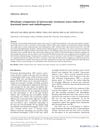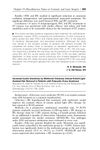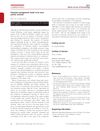 1 citations,
January 2009 in “Elsevier eBooks”
1 citations,
January 2009 in “Elsevier eBooks” The document concludes that a deeper understanding of skin aging and photodamage is needed to create better skin treatments.
April 2024 in “International journal of molecular sciences” Light-based treatment, Photobiomodulation, shows promise for non-invasive skin therapy with few side effects.
 January 2018 in “Springer eBooks”
January 2018 in “Springer eBooks” Different races and genders have unique skin and hair issues, requiring specialized care and more research for effective treatment.
 January 2013 in “Dermatologic Clinics”
January 2013 in “Dermatologic Clinics” Hair disorders need a holistic approach, including medical, cosmetic, and psychological support.
 82 citations,
May 2016 in “Best Practice & Research in Clinical Obstetrics & Gynaecology”
82 citations,
May 2016 in “Best Practice & Research in Clinical Obstetrics & Gynaecology” The conclusion is that managing androgen excess requires long-term treatment, including hormonal contraceptives and androgen blockers, with follow-up after six months.
 30 citations,
May 2014 in “American Journal of Clinical Dermatology”
30 citations,
May 2014 in “American Journal of Clinical Dermatology” The conclusion is that better understanding and more research are needed to effectively manage follicular and scarring disorders in skin of color, with an emphasis on patient education and cultural awareness.
 22 citations,
March 2018 in “American Journal of Clinical Dermatology”
22 citations,
March 2018 in “American Journal of Clinical Dermatology” New acne treatments show promise as alternatives to traditional therapies.
 13 citations,
January 2016 in “Journal of cosmetology & trichology”
13 citations,
January 2016 in “Journal of cosmetology & trichology” Alternative treatments show promise for hair growth beyond traditional methods.
 2 citations,
August 2016 in “Lasers in Surgery and Medicine”
2 citations,
August 2016 in “Lasers in Surgery and Medicine” Photodynamic therapy can remove nonpigmented hair in mice and might work for humans.
23 citations,
October 2020 in “Anais brasileiros de dermatologia/Anais Brasileiros de Dermatologia” Tailored treatments for alopecia areata are recommended based on severity and patient needs.
 January 2001 in “Dermatologic Surgery”
January 2001 in “Dermatologic Surgery” The letters discussed medical tools, costs, treatment efficacy, and patient care complexities.
 107 citations,
December 2013 in “International Journal of Dermatology”
107 citations,
December 2013 in “International Journal of Dermatology” The document concludes that hair is complex, with a detailed growth cycle, structure, and clinical importance, affecting various scientific and medical fields.
1 citations,
May 2017 in “InTech eBooks” New treatments focusing on immune pathways show promise for stubborn hair loss.
 August 2023 in “Dermatology and Therapy”
August 2023 in “Dermatology and Therapy” Experts recommend personalized treatment plans for best outcomes in managing Alopecia Areata.
 January 2023 in “Dermatologic Therapy”
January 2023 in “Dermatologic Therapy” A new hand-held light therapy device was found to be safe and effective for treating mild-to-moderate acne.
 11 citations,
January 2020 in “Dermatologica Sinica”
11 citations,
January 2020 in “Dermatologica Sinica” Tofacitinib helps regrow hair in severe alopecia patients, but more research is needed.
 27 citations,
August 2014 in “Journal of Cosmetic and Laser Therapy”
27 citations,
August 2014 in “Journal of Cosmetic and Laser Therapy” Different lasers and radiofrequency affect skin differently, important for dermatologists to choose the right treatment.
33 citations,
October 2016 in “Photomedicine and laser surgery” Future clinical uses of Intense Pulsed Light (IPL) are likely to grow and become more effective with new advancements and combined treatments.
 January 2010 in “The Year book of dermatology”
January 2010 in “The Year book of dermatology” Taking metformin with intense pulsed light therapy improves hair removal for women with PCOS.
 10 citations,
January 2009 in “Elsevier eBooks”
10 citations,
January 2009 in “Elsevier eBooks” Hair growth is influenced by hormones and goes through different phases; androgens can both promote and inhibit hair growth depending on the body area.
 59 citations,
May 2014 in “Expert Opinion on Therapeutic Targets”
59 citations,
May 2014 in “Expert Opinion on Therapeutic Targets” The document concludes that targeting 5α-reductase, the androgen receptor, and hair growth genes, along with using compounds with anti-androgenic properties, could lead to more effective hair loss treatments.
 15 citations,
February 2014 in “BMC Research Notes”
15 citations,
February 2014 in “BMC Research Notes” The X5 Hairlaser might help treat male hair loss, but more research is needed.
 July 2016 in “British journal of dermatology/British journal of dermatology, Supplement”
July 2016 in “British journal of dermatology/British journal of dermatology, Supplement” Hirsutism treatment should focus more on patient needs and quality of life.
 38 citations,
September 2017 in “Oncologist”
38 citations,
September 2017 in “Oncologist” Scalp cooling can help prevent chemotherapy-induced hair loss with a 50-90% success rate and is safe for patients.
 8 citations,
July 2012 in “Cambridge University Press eBooks”
8 citations,
July 2012 in “Cambridge University Press eBooks” Androgens can both increase body hair and cause scalp hair loss.
 July 2024 in “Annals of Phytomedicine An International Journal”
July 2024 in “Annals of Phytomedicine An International Journal” Herbal ingredients like aloe vera and hibiscus can help with hair problems like hair loss and dandruff.
 209 citations,
September 2008 in “Dermatologic Therapy”
209 citations,
September 2008 in “Dermatologic Therapy” Androgens can both increase and decrease hair growth in different parts of the body.
 150 citations,
January 2018 in “Burns & Trauma”
150 citations,
January 2018 in “Burns & Trauma” Bioprinting could improve wound healing but needs more development to match real skin.
 119 citations,
March 2020 in “Frontiers in Bioengineering and Biotechnology”
119 citations,
March 2020 in “Frontiers in Bioengineering and Biotechnology” Asia has made significant progress in tissue engineering and regenerative medicine, but wider clinical use requires more development.
 72 citations,
October 2009 in “The FASEB journal”
72 citations,
October 2009 in “The FASEB journal” TRH stimulates human hair growth and extends the hair growth phase.


























